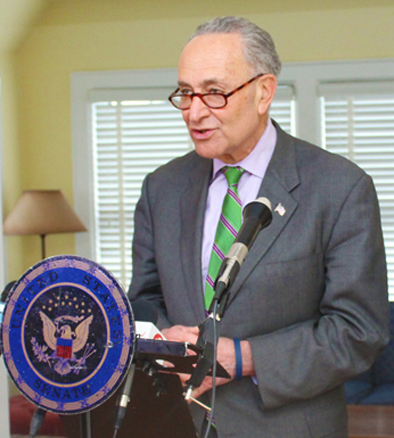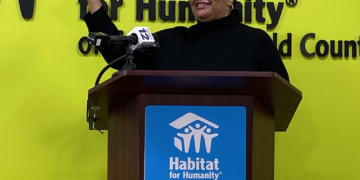U.S. Sen. Charles Schumer of New York, who was deeply involved in negotiating the Senate version of the $2 trillion economic package that was firmed up overnight and is designed to help shore up the economy from the effects of the COVID-19 pandemic, provided some details of what’s in the package.
The legislation would still needs to be agreed to by the House of Representatives.
Highlights of the Senate bill include:
Ӣ providing approximately $375 billion for small businesses that would include help from the Small Business Administration in meeting payrolls;
Ӣ $500 billion in loans for large corporations;
Ӣ $150 billion in aid for local and state governments;
Ӣ $130 billion in aid for hospitals;
Ӣ four months of unemployment insurance payments for people out of work; and
Ӣ direct payments to U.S. citizens of $1,200 for most adults and $500 for each child.
Schumer, interviewed on MSNBC this morning, said that the unemployment benefits were expanded during negotiations from what Republicans had originally put in the bill.

“We created something called ‘unemployment on steroids.’ If your employer has to let you go, they don’t let you go, they furlough you and unemployment insurance pays you all, for almost all people, their whole salary, or close to it, and that’s for four months. We got that extended to four months,” Schumer said. He said the unemployment benefits would apply to freelancers.
Schumer explained that the original bill allowed only Treasury Secretary Steven Mnuchin to control the pool of $400 billion designed for large corporations and Mnuchin could act in secret and not have to reveal to the American people where the money had gone for six months. Schumer said the negotiated version of the bill provides for decisions to be made by a panel of five that would have to notify Congress within a week about disbursements and make those disbursements public within in two weeks.
In a statement later released by his office, Schumer said that the bill would bring about $40 billion to New York and its residents.
He said the legislation includes a massive new grant program for hospitals and health care providers, personal and protective equipment for health care workers, testing supplies, increased workforce and training, new construction to house patients, and emergency operation centers. Hospitals and health care providers would receive increases in Medicare payments.
He said New York state would receive approximately $7.5 billion in funds. Westchester County would receive $168 million.
Transit systems, including New York’s Metropolitan Transportation Authority, would receive funding. Of the $25 billion total, the MTA would receive $3.8 billion.
The $375 billion for small businesses provides low-interest or no-interest loans that eventually could be converted into grants and forgiven. The aid also would be available to nonprofits.
Schumer said that there would be relief for businesses that currently have an estimated 19,000 Small Businesses Administration loans outstanding in New York. They would not have to pay the principal, interest and fees for six months.
Schumer said negotiations resulted in making rent, mortgage and utility costs eligible for SBA loan forgiveness; banning stock buybacks for the term of the government assistance plus one year for any company receiving a government loan from the bill; adding a retention tax credit for employers to encourage businesses to keep workers on payroll during the crisis; providing income tax exclusion for individuals who are receiving student loan repayment assistance from their employer; and eliminating a $3 billion bailout for big oil companies.
“My dad was a small businessman, exterminator,” Schumer said on MSNBC. “I know how businesspeople struggle and now it’s worse. You spend years of blood, sweat and tears building up your business and now it’s gone? Well, this will give you short-term very low- or no-interest loans so you can keep your business going any pay your employees to stick with you. So this package is big help, quick help for the American people, right in the places we need it most.”





















